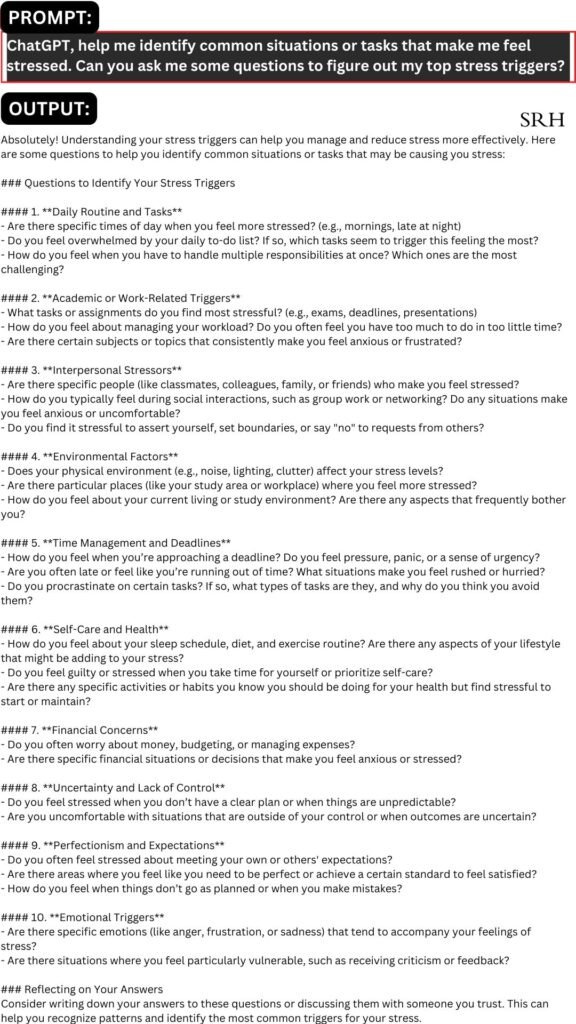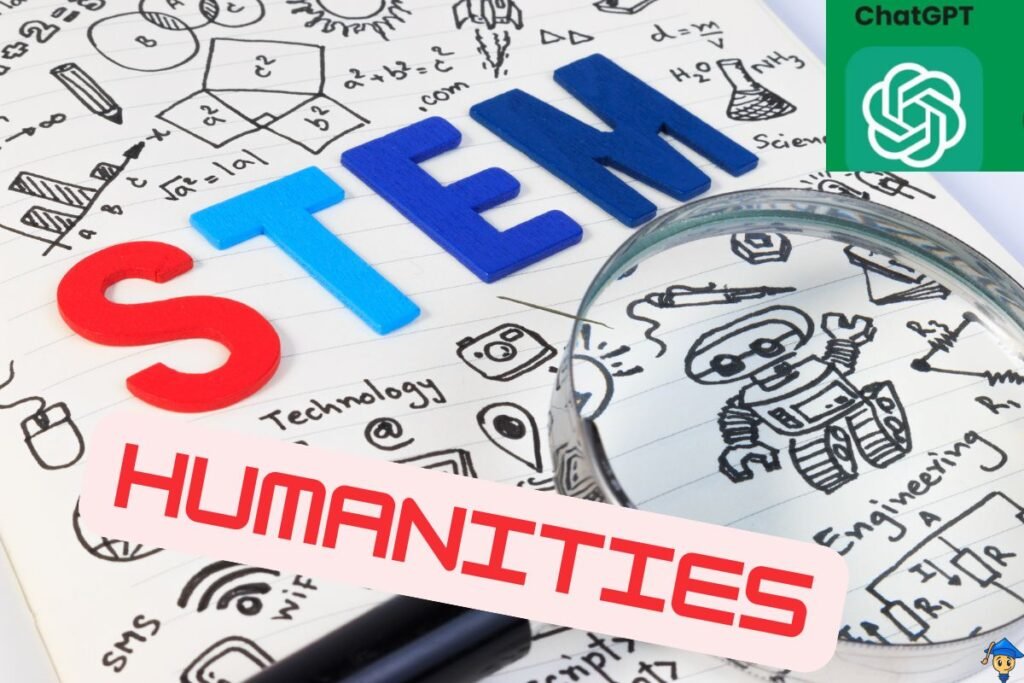Stress is always a common challenge for all, especially students. Managing it effectively is crucial for both academic success and personal well-being. While there are many stress management techniques, what works for one person might not work for another. This is where AI can help.
Fortunately, we are living in the age of Artificial Intelligence(AI). By leveraging, AI tools like ChatGPT, you can create personalized stress management strategies that suit your needs. Most interestingly, it saves you time. But, there is a bit of a problem. Chatbot requires effective unbiased prompts, instructions or inputs. Don’t worry! I’m here to help you. It’s my duty.
So, in this article, I will guide you on how to do this, providing ready-to-use prompts to get you started.
Let’s dive in!
Understanding Your Stress Triggers
Before you can manage your stress, it’s important to know what triggers it. AI can help you explore these triggers by asking the right questions.
Prompt Example 1:
“ChatGPT, help me identify common situations or tasks that make me feel stressed. Can you ask me some questions to figure out my top stress triggers?”
This prompt encourages ChatGPT to guide you through a self-reflection process. By answering these questions, you can pinpoint specific events, tasks, or situations that cause you stress. For example, you might realize that deadlines or social situations are your main stressors.
Let’s see the following output:

Disclaimer: ChatGPT is not a doctor. Always double-check the responses, especially if related to health and finance.
Developing a Stress Response Plan
Once you know your triggers, the next step is to create a plan to manage your stress. A stress response plan includes actions you can take when you feel stressed. AI can suggest various techniques based on your preferences.
Prompt Example 2:
“ChatGPT, based on the stress triggers I’ve identified, can you suggest some quick stress-relief techniques I can use when I start to feel overwhelmed?”
With this prompt, ChatGPT can recommend strategies like deep breathing, short walks, or quick meditation exercises. The key here is to find techniques that you can easily incorporate into your daily routine.
Building Long-Term Stress Management Habits
Short-term solutions are helpful, but building long-term stress management habits is even more important. AI can help you develop these habits by creating a personalized routine.
Prompt Example 3:
“ChatGPT, can you help me design a daily routine that includes regular stress management activities? I want something that fits into my schedule and helps prevent stress before it starts.”
This prompt allows ChatGPT to craft a routine that might include morning meditation, regular breaks during study sessions, or a bedtime relaxation exercise. By incorporating these habits into your daily life, you can manage stress more effectively in the long run.
Tracking Your Stress Levels
Another important aspect of stress management is tracking your stress levels over time. AI can assist with this by helping you record and analyze your stress patterns.
Prompt Example 4:
“ChatGPT, I want to track my stress levels daily. Can you help me create a simple system to record how I’m feeling each day and analyze any patterns over time?”
Using this prompt, ChatGPT can suggest ways to track your stress, such as keeping a daily stress journal or using a rating system (e.g., 1-10). Over time, you can review these records to identify trends and adjust your stress management strategies accordingly.
Seeking Additional Support
While AI can provide helpful strategies, sometimes it’s important to seek support from others. ChatGPT can guide you on when and how to reach out for help.
Prompt Example 5:
“ChatGPT, if my stress levels remain high despite using these techniques, how should I seek additional support? Can you suggest ways to talk to a counselor or find other resources?”
With this prompt, ChatGPT can offer advice on seeking professional help, such as how to approach a school counselor or where to find online support groups. Knowing when to ask for help is a crucial part of managing stress effectively.
Customizing Your Approach
One of the strengths of using AI for stress management is the ability to customize your approach. Everyone’s stress is different, and AI can tailor strategies to fit your unique situation.
Prompt Example 6:
“ChatGPT, I’m an introvert and find social situations stressful. Can you suggest some strategies that specifically help with social anxiety?”
This prompt encourages ChatGPT to offer advice that aligns with your personal preferences. Whether you’re dealing with social anxiety, academic pressure, or something else, AI can provide strategies that are a perfect fit for you.
Reviewing and Adjusting Your Strategy
Stress management is not a one-time task. It’s something that requires ongoing attention and adjustments. AI can help you review and refine your strategies as your needs change.
Prompt Example 7:
“ChatGPT, can we review my current stress management strategies? I’d like to know if there are any areas where I can improve or try new techniques.”
This prompt allows ChatGPT to help you assess what’s working and what isn’t. It can suggest new strategies or modifications to your current plan, ensuring that your stress management approach evolves with your needs.
Conclusion
Managing stress is a personal journey. What works for one person may not work for another. But with the help of AI, you can create a stress management strategy that’s tailored specifically to you. Whether you’re identifying triggers, developing a response plan, or tracking your progress, AI tools like ChatGPT can provide the guidance and support you need. Remember, it’s important to review and adjust your strategy regularly to ensure it continues to meet your needs.
So, by leveraging the prompts given in this article, you can start building a personalized stress management plan today. Take control of your stress, and create a strategy that works for you.
Good Luck!





